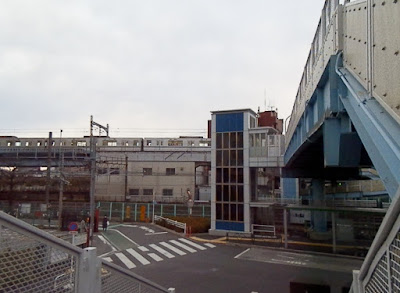Downtown Tokyo
Japan and China around 1900
One of the keywords to understanding Japan of today is the Meiji Restoration of the imperial authority of 1868.
It specifically means a big regime change through a civil war. In this incident, samurais, or the ruling class of Japan consisting of warrior clans, were split into two groups: the pro-Tokugawa shogun camp and the anti-Tokugawa/pro-imperial camp. In this armed conflict, the shogun from the Tokugawa clan, or the king of samurais, was forced to step down, putting an end to the feudalistic era of Japan. Subsequently, samurais who took over power started modernization and westernization in a full scale.
Then the government newly formed with the Emperor of Meiji at its center had to tackle an imminent issue: how to protect Japan from Western colonizing powers. Especially, Russia coming down from Siberia was a formidable potential enemy.
The Meiji Government of Japan then found that its security and economic development needed keeping hegemony over the Korean Peninsula and Taiwan while making clear the borders to Russia. In this context, Tokyo requested the Korean Kingdom to open the nation and establish a trading relation with Japan. However, the Korean Kingdom was a tributary country to China, or the Qing Dynasty. Inevitably, China and Japan came into collision with each other over the hegemony over the Korean Peninsula. The Korean Kingdom itself was a secluded nation governed by the noble class that treated Korean farmers like slaves. There was no possibility that Koreans could modernize and westernize themselves by themselves.
Finally, in 1894 the Empire of Japan, whose imperial constitution was enacted in 1890, started to engage in war against China, which is called the first Sino-Japanese War. The Empire of Japan defeated China. Both Japan and Qing had imported a sufficient number of war ships and modern weapons from Western nations. But the Qing court spent some of its budget for luxuries without taking the Japanese challenge so seriously, while Japan was strengthened not only by modern weapons but also traditional samurai spirit.
China lost its political influence on the Kingdom of Korea. Tokyo even acquired Taiwan. And, this war gave a great shock not only to the imperial court of Qing but also to Western nations. Russia, the UK, France, Germany and so on intensified their invasion of China. This defeat shook the Qing dynasty more than the Opium War in 1840s where the dynasty was defeated by England.
In the wake of this first Sino-Japanese War, the Empire of Japan came to face directly Russians who had always sent its troops in Manchuria, north of Beijing, through various diplomatic pressures on the Qing court. Japanese also came to actively engaged in commercial activities in mainland China. Japanese business men expanded their business to Shanghai and other big cities in China with support from the imperial military of Japan. As a result, Japanese power of influence came to compete with the UK occupying Hong Kong and the US colonizing the Philippines.
One of symbolic incident before the Japanese -Russo War (1904-1905) was the Boxer Rebellion of 1900.
The uprising took place against a background of severe drought and the disruption caused by the growth of foreign spheres of influence. After several months of growing violence against the foreign and Christian presence in Shandong and the North China plain, in June 1900, Boxer fighters, convinced they were invulnerable to foreign weapons, converged on Beijing with the slogan "Support Qing government and exterminate the foreigners." Foreigners and Chinese Christians sought refuge in the Legation Quarter (of Beijing). In response to reports of an armed invasion to lift the siege, the initially hesitant Empress Dowager Cixi supported the Boxers and on June 21 declared war on the foreign powers. Diplomats, foreign civilians and soldiers as well as Chinese Christians in the Legation Quarter were placed under siege by the Imperial Army of China and the Boxers for 55 days.
Foreign navies started building up their presence along the northern China coast from the end of April 1900. Several international forces were sent to the capital, with varying success, and the Chinese forces were ultimately defeated by the Eight-Nation Alliance of Austria-Hungary,France, Germany, Italy, Japan, Russia, the United Kingdom, and the United States.
British Lieutenant-General Alfred Gaselee acted as the commanding officer of the Eight-Nation Alliance, which eventually numbered 55,000. The main contingent was composed of Japanese (20,840), Russian (13,150), British (12,020), French (3,520), U.S. (3,420), German (900), Italian (80), Austro-Hungarian (75) and anti-Boxer Chinese troops.[77] The international force finally captured Tianjin on 14 July under the command of the Japanese Colonel Kuriya, after one day of fighting.

https://en.wikipedia.org/wiki/Boxer_Rebellion
It was Japanese Marines that most contributed to the victory of the Eight-Nation Alliance.
However, it should be noted that in 1900 there were so many foreign troops around Beijing suppressing Chinese troops and militias. This is the very situation that Japanese wanted to avoid and could avoid when the Meiji Restoration was carried out in 1868 in Japan. To avoid foreign occupation of Japan, Japan had to first carry out the great regime change, the Meiji Restoration, to concentrate its national power on a new government with the emperor at its center. Japan had succeeded in avoiding attacks from the Western powers, but it joined them to invade China.
The complicated relationships between Japan and China actually started with the Boxer Rebellion if not with the first Sino-Japanese War.
**** **** ****
Luk 6:30 Give to every man that asketh of thee; and of him that taketh away thy goods ask them not again.


